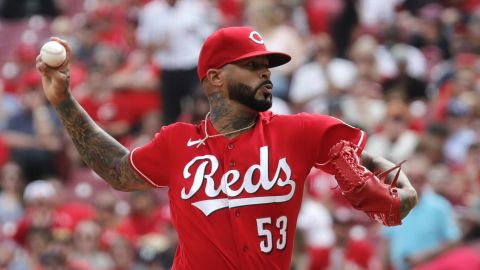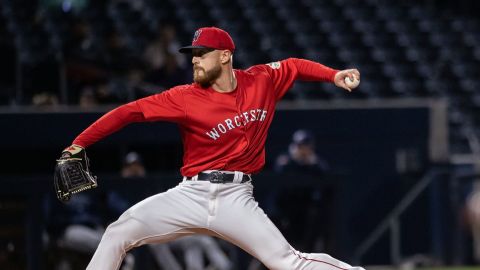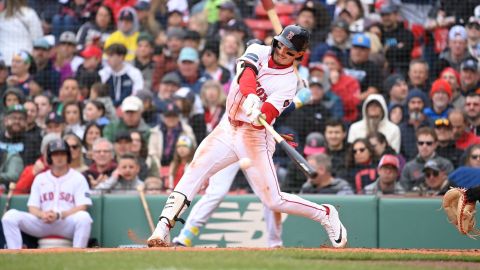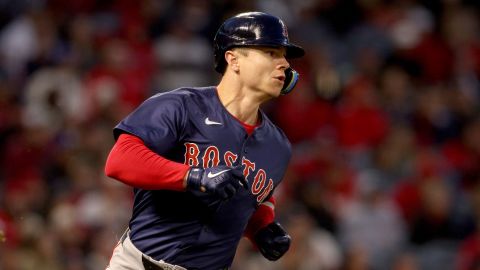Finally, an answer to the question everyone wants to ask.
When J.D. and Stephen Drew play against each other, what do they bet on?
"No bets,” said Stephen. “Low key, and just play. That's how we are."
If that doesn’t perfectly characterize this pair of brothers, nothing does.
This is not Peyton and Eli we’re talking about. You won’t be seeing Stephen and J.D. facing off in any Oreo Showdown commercials any time soon. They come to the ballpark, they do their jobs, they go home, they keep quiet.
They may be eight years apart and on different coasts, but besides the fact that one is an outfielder in Boston and the other is a shorstop in the desert, the Drew brothers aren’t much different at all.
"I've kind of watched the way he carries himself on the field,” Stephen said prior to Wednesday’s game at Fenway Park. “We're kind of the same — don't say much, go play and just do your job and that's it."
Though J.D. started his major league career in 1998 and Stephen didn’t start his until 2006, they’ve crossed paths frequently – mostly because when Stephen came up with the Diamondbacks, J.D. was in his final year with Los Angeles.
Since then, though, family time has been harder to come by – so at times like these, when interleague puts the two of them not only in the same time zone but in the same ballpark, it’s like a nice little 72-hour taste of the offseason.
"It's good to see him. It really is,” Stephen said. “The season's so long, and especially with three-hour [time] difference … the only way we keep in contact is by text or calling or every now and then Skype. It's good to see him.”
That comfort seems to be bringing out the best in the ballplayer in each of them.
In Tuesday’s series opener, Stephen notched the first hit, stole the first base and scored the first run against Clay Buchholz. J.D., meanwhile, went 2-for-4, singling to left when his brother was in a shift up the middle.
“Yeah, I saw him over there, and it was an opportunity to hit the ball to left field, so
it worked out,” J.D. said after the game. “I don't think he was anticipating that, but some things change over time. [It gives us something] to rag on each other about. It's always fun.”
Tuesday’s game marked the 16th time the brothers have played in the same game, and in those games, J.D. is hitting .383 with eight runs, four doubles, five homers and 17 RBIs. One of J.D.’s best games ever came against his younger brother — on June 8, 2007, he went deep twice against the Diamondbacks and set a career high with seven RBIs.
In those same 16 games, Stephen is batting .328 with eight runs, three doubles, a triple, a homer and six RBIs.
But maybe it’s just a coincidence.
“It’s a little competition between brothers,” J.D. said. “It's just one of those things, just getting pitches to hit.”
A 10-year age difference is a big gap, but the brothers have remained close, even when J.D. went across the state border to play his college ball at Florida State in 1994.
“Me and Stephen have always been close,” J.D. said. “He followed me around at Florida State, was there pretty much every weekend. He was 10 and I was 18, so he had a chance to spend a lit of time over there.”
Stephen followed closely in J.D.’s steps, committing to FSU and head coach Mike Martin almost a decade afterward. By that time, J.D. was long gone, but still, he left quite a legacy in his wake. J.D. was the first player in college baseball history to hit 30 homers and steal 30 bases in the same season, and he set an FSU record when he hit .455 during his junior year. He also became one of just three college players in history to have 100 hits, score 100 runs and knock in 100 RBIs.
They were big shoes to fill, but Stephen wasn’t worried about inevitable comparisons to his big brother.
"He had a really good college career, but we're two different positions, anyhow,” Stephen said. “From a player's standpoint, you probably think there's a little bit [of expectation based on J.D.], but you have to look past that. You're there to help your team, and there was an eight-year difference. … When I got there, I knew everybody was there, anyway. It was nothing new for me."
And right off the bat, Stephen did just fine paving his own way with the Seminoles, becoming Baseball America’s Rookie of the Year and the ACC Rookie of the Year in 2000 on his way to becoming the 15th overall pick in the 2004 draft.
J.D. may have paved the way, and he may have the upper hand in terms of experience, but he could learn a thing or two from his little brother.
"I could teach him how to play the infield, if he ever got in there,” Stephen said. “That's the only thing I could teach him how to do, but he ain't going in there. He's sticking to outfield."
They’ve come a long way from the days of playing catch in the front yard in Valdosta, Ga., but in a way, playing against each other at one of America’s beloved ballparks isn’t all that different. It’s still the same game, and they’re still the same people.
"You still go out there, you still compete and you go home afterward,” Stephen said. “But to play against him — growing up and watching him, to get to where he's at, it's always fun."



